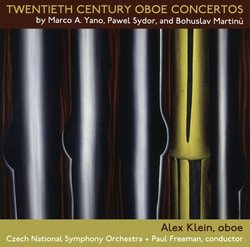Moving Recent Oboe Works For One of Its Brilliant
rodboomboom | Dearborn, Michigan United States | 01/09/2006
(5 out of 5 stars)
"Klein easily is one of the superb oboists of our time. Here he records the concertos of three modern composers, two of which were composed specifically for him in mind.
The first is of Czech descent, and the oldest of the trio having been composed in 1955. What strikes the listener is the inclusion of the piano as an accompanying soloist with the oboe, especiallly in the final two movements. As liner notes relate, extreme sense in this music of isolation. Outstanding oboe with its fast moving chromatic sections and the subtle, eiry power of that sustained tone in the final movement.
The Sydor piece came as a result of composer's education at Oberlin when Klein was teaching there, and so this was written for him emboldened by his native Poland in honor of the event which bears the piece's title. From composer's own liner notes we learn that it is battle between Poland societal elements with the oboe sounding individual common man seeking to save ideals. In this epic movement back and forth between soloist and orchestra there is some unique and evocative oboe sounds.
The third and final piece has become my favorite, with absorbing notes of the piece written by Klein. Yano of same Brazilian native land, was commissioned by Klein for this piece, but passed away from brain cancer in doing so, left to Yano's teacher and Klein to fill in. Magnificent lilty movement in the final.
Klein is heard here to be a clean, clear passionate artist on an extremely difficult instrument to play, but here evidenced as one of the best of our times playing this magnificent 20th C concertos.
Excellent choice to add to your listening enjoyment."
Even the virtuoso has his limits.
Richard Threadgall | University of Virginia, Charlottesville | 12/20/2008
(3 out of 5 stars)
"Despite my enthusiasm for Klein, unquestionably one of the great performers of our time, and despite the high quality of each of the three performances on a technical level on the part of both Klein himself and the Czech NSE, the recording as a whole was for the most part a disappointment.
The Martinu concerto is excellent, and if nothing else this CD is an admirable introduction to his work. Notably, the Klein of this recording is very different from the creamy, flexible recordings of the 80s and early 90s--his style has become much more rigid and abstract, hard-edged, you might say. However, the simple compositional quality of the remaining two compositions is very low. The Sydor piece is clattery and obnoxious, accompanied by some of the most pompous and adolescent program-writing I've ever seen--the struggle of "the common man fighting to save the last ideals from being dishonored" against "the Maggots"? What, is the composer channeling his inner highschool socialist? Really embarrassing stuff. Lastly, Yano's piece alternates between intellectually disorganized (post) modernism and disappointingly conventional tonal movements. The themes are catchy, but the treatment--especially compared to the great folk music-inspired symphonies that came out of England in the early years of this century (E. J. Moeran and Vaughan Williams especially come to mind)--is very flat, very superficial. Even Klein's mastery couldn't save this stuff."

